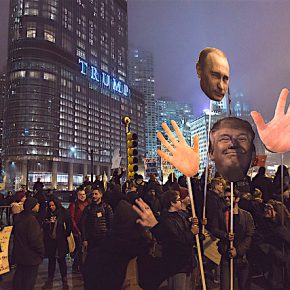For the last hundred and fifty years or more, scholars have been wont to claim that magic has been dissipating as a force in society. Yet at no time since the Middle Ages has the role of intangible forces and powers been so central to the social order.
While the rituals and invocations have been transformed by their imbrication in electronic media, the underlying need of the modern masses to obtain some purchase on the webs in which their lives are enmeshed is ever more profound in the camera obscura of modern mass society.
“The fate of our times,” the sociologist Max Weber famously noted, “is characterized by rationalization and intellectualization and, above all, by the disenchantment of the world.” This disenchantment (Entzauberung or literally “de-magicking”) was a fundamental characteristic of a modern world in which rational calculation was becoming the dominant mode of social action and was, in fact, actively colonizing all aspects of human conduct.
This is a theme which has, in one guise or another, spread throughout our understanding of modernity. The historian Keith Thomas, for instance, made extensive and explicit use of it in his magisterial work Religion and the Decline of Magic:
The technological primacy of Western civilization, it can be argued, owes a sizeable debt to the fact that in Europe recourse to magic was to prove less ineradicable than in other parts of the world. For this, intellectual and religious factors have been held primarily responsible. The rationalist tradition of classical antiquity blended with the Christian doctrine of a single all-directing Providence to produce what Weber called ‘the disenchantment of the world’ – the conception of an orderly and rational universe, in which effect follows cause in predictable manner. A religious belief in order was a necessary prior assumption upon which the subsequent work of the natural scientists was to be founded. It was a favourable mental environment which made possible the triumph of technology.
The public sphere was subject to this transformation, no less than the other sectors of society. It became, or was seen as having become (by Habermas among others) a space in which political ideas and ideals could be subjected to rigorous, rational consideration. If it was never the case that this level of rational engagement was, in practice, universally available or open, it was at least arguable that the ideological superstructure of society was considered in something approximating public view.

Deficient and problematic as this was, it was, nonetheless, not nothing. The space of the public sphere was transformed from one comprising rational argumentation by experts (or at least the well-informed) to a seamless backdrop for spectacular images as a medium for the maintenance of the social order.
Both dominant political parties have shown a pronounced allergy to facts that disrupt convenient narratives. The media functionaries of the current administration have shown a readiness to be particularly aggressive about rejigging the public sphere to suit their own designs. At the most obvious level, the insistence on alternative facts and the conflation of vigorous assertion with facts illustrates a furthering of the structural transformation of the public sphere that Habermas had already noted in 1961 in his famous habilitationsschrift. The muzzling of federal agencies’ functions of collecting and providing data can correctly be seen as the reverse side of the same coin.
As it increasingly becomes the case that the facts cannot be reliably ascertained, a new space is created for the power of assertion to achieve its full measure of influence. This is one of the real particularities of the information age. It used to be the case that information was jealously guarded and compartmentalized. In the course of the second half of the twentieth century, it became clear that a surfeit of information was a much more effective means of camouflage.
Since the middle of this century, sociologists (Schumpeter and Luhmann being two prominent examples) have noted the increasing complexity of society. This creates inherent problems for theories of democracy based on rational decisions by well-informed individuals. Schumpeter, following in a certain sense on the political writings of Weber, viewed the solution as rule by experts with a veneer of democracy superadded just to keep the hoi polloi from revolting. The extension of the reach of electronic media and the massive increase in the volume of information available through it has led, somewhat ironically, to a revival in magical thinking as the citizens of the modern world try vainly to come to terms with the brave new information landscape.
Thus we have a situation in which Donald Trump has promised to be the agent of the return of manufacturing jobs to the United States. The impossibility of his doing so is obvious to any thinking person and, in fact, is one of the few things on which economists seem to agree, irrespective of political coloring. But Trump has calculated, probably correctly, that the return of jobs has become the goal of rituals and incantations the validity of which are not (or are only tenuously) connected to their actual efficacy. In a very important sense, it makes no difference whether the promised jobs actually materialize or not.
In this, there is a peculiar similarity to the New Deal. Although scholars have continued to debate what material good it did, it is beyond question that it gave people at the lower end of the income distribution the impression that someone in the halls of power actually cared what happened to them. The difference now is that public intellectuals are reconfigured as shamans invoking the spirit of truth (or perhaps truthiness) as opposed to working with anything so base as the demonstrably factual.

For a large proportion of Americans, modern society has become like the weather: something about which to complain and over which one had no power. This goes a long way toward explaining both the political successes of Trump and, rather paradoxically, those of his predecessor. The change that Barack Obama represented (but did not deliver) was the final, watered-down echo of the civil rights and liberation movements of the 1960s.
But that moment has utterly passed away, its morality forever expended in an increasingly fruitless long march through the institutions of American power. It is doubtful whether Obama was ever going to deliver anything of substance (the fact that he failed to do so given Democratic control of the legislative branch in his first term makes this patently clear). His only offer was a rehearsing of the old terms and slogans, bereft of the power to effect change.
The vote for Donald Trump was, once again, an expression of a deep-seated desire for change. But this change was a reversion rather than progress. He represented a vision of a rebirth of an older world, one in which white males could speak and be believed (and deferred to) and where jobs could be had that might last longer than a week or a season. The peculiarity of President Trump’s program (or one of them anyway) is that what was being purveyed was not an idea but a feeling.
Trump, the chief (or perhaps the grand) wizard of the modern Republican Party, offers things that he cannot deliver (such as industrial jobs reclaimed from robots) but the unreality of his promises is a secondary matter. The president’s tone promises the favor of the gods, rather than individual favors to individual men. And if these promises never bear fruit, well, that was never really the point anyway.
For decades, the Republican Party has been experimenting with ways to convince poor whites to vote against their own economic interest. Donald Trump has taken over the results of these experiments (racism, patriarchy, xenophobia sold to the remains of the white working class as words to conjure with) and powered them to levels not seen since the darkest days of the middle of the last century.
Trump has given people in the lower orders, or at least those of them who are white, the unfounded belief they will be able to exert the same level of control over their lives that Ward Cleaver exerted over his.
Photographs courtesy of Joel Schalit. Published under a Creative Commons license.





